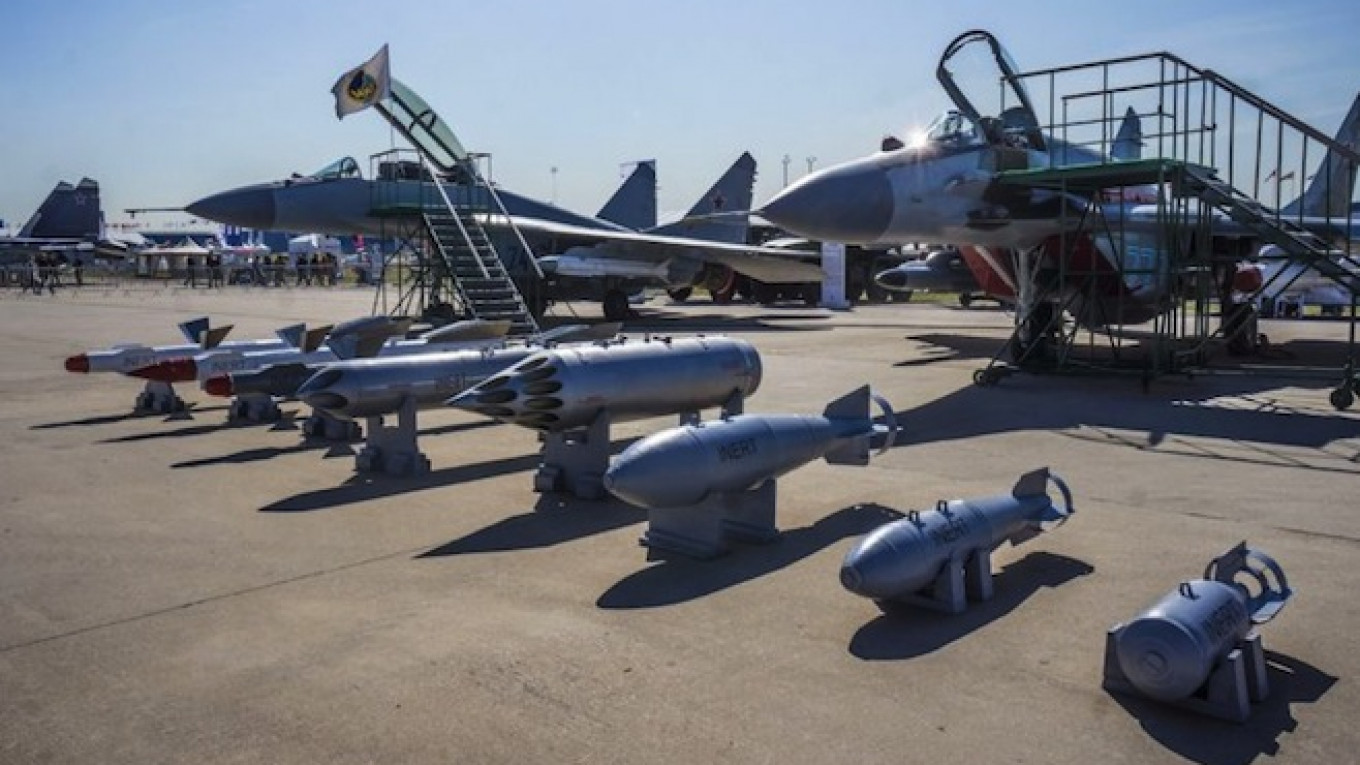Russia's largest air show, the International Aviation and Space Salon (MAKS) wrapped up its business program on Thursday, and is now shifting into gear for the weekend's public exhibitions.
The event, which is held every two years, was described by President Vladimir Putin at its opening ceremony on Tuesday as “an effective platform for contacts between experts and developing production cooperation and finding new [trading] partners.”
MAKS this year featured about 600 Russian companies and more than 150 foreign firms representing around 30 countries, according to the Kremlin website. The highest profile visitors were the Saudi and Jordanian kings, Egyptian President Abdul Fattah al-Sisi, as well as Chinese and Iranian military delegations.
Though high-profile visitors attended the 2015 show, attendance was down from the 1,000 companies represented at MAKS 2013.
The event was expected to be a major forum for launching negations for Russian arms sales and even inking a few in-the-works deals. The Moscow Times took a look at the biggest deals, meetings and announcements from MAKS.
Military Aircraft
Though MAKS has in the past been a large venue for civil aviation deals, this year's event had a decidedly military character. In terms of military fighter deals, the largest announcement came from Russia's own United Aircraft Corporation (UAC) — a massive state-owned industry conglomerate that owns most of Russia's aviation enterprises.
UAC President Yury Slyusar said at the company's press conference Wednesday that a contract would be signed with Russia's Defense Ministry by the end of this year for the production and delivery of 48 new Su-35 multi-role fighter aircraft.
The contract will be a repeat of an order for 48 Su-35 fighters signed in 2009. The deliveries will be completed this year. The Su-35 is currently Russia's most advanced in-production fighter jet.
“This order is very important for us,” Slyusar was quoted by news site HYPERLINK "http://Lenta.ru/"Lenta.ru as saying. “It demonstrates that the first order was completed, and that the military is satisfied with the performance of the first batch of planes.”
The contract — with an estimated value of 100 billion rubles ($1.5 billion) was expected to be signed at MAKS, newspaper Vedomosti reported earlier this month. However, Slyusar said that the two sides have yet to agree on the final terms for the deal.
Though MAKS may have served as a major forum for laying the groundwork for future contracts with China, India, Iran, Egypt, Saudi Arabia and Jordan, nothing was announced. Iran was expected to sign a deal for S-300 missile systems this week, but no announcement has been made.
Instead, the MiG aircraft corporation announced it will sign a contract for its new MiG-35 fighter with the Russian Defense Ministry in 2016, and Belarus penned a contract with Russia for a handful of Yak-130 training aircraft and Tor-M2K air defense systems, according to the RIA Novosti news agency.
On Tuesday, the head of state arms export agency Rosobornexport, Anatoly Isaikin, said Russia's export backlog of aviation hardware stands at over $18 billion. The entire portfolio of Russian arms export contracts is valued at over $40 billion, he added.
Civilian Aircraft
Though the military side of the MAKS air show appears to have done what it needed to do — lay the groundwork for future deals, if not finalize them on site — the civilian side of the air show appears to have been underwhelming.
The last MAKS air show, held in 2013, generated around $21 billion in civilian aerospace deals, news agency Reuters reported on Tuesday, but big ticket foreign airline and manufacturing agreements were no where in sight this year.
Part of this can be blamed on the collapse of the Russian ruble, which has prompted Russian airlines to halt purchases of foreign Boeing and Airbus passenger planes. Sanctions are also hurting the ability of the Russian aerospace industry to sell its expensive Sukhoi Superjet-100 passenger jet.
UAC is subject to European sanctions, which effectively cut it off from global debt markets, which are used to finance billion dollar aerospace deals. This has forced to Russian government to step in and provide loans.
This paid off on Tuesday, when UAC inked an agreement with the Russian State Transport Leasing Company to supply 32 of the new Superjets, which have struggled to compete against similar aircraft made abroad. The deal's value is estimated at $1.1 billion, Reuters reported.
Although U.S. aerospace giant Boeing fielded a token presence at MAKS, its European competitor Airbus used the event to showcase its brand new Airbus A350XWB passenger plane — a rival to Boeing's long-range 777 — making it the only foreign company exhibiting a large aircraft.
Contact the author at m.bodner@imedia.ru
A Message from The Moscow Times:
Dear readers,
We are facing unprecedented challenges. Russia's Prosecutor General's Office has designated The Moscow Times as an "undesirable" organization, criminalizing our work and putting our staff at risk of prosecution. This follows our earlier unjust labeling as a "foreign agent."
These actions are direct attempts to silence independent journalism in Russia. The authorities claim our work "discredits the decisions of the Russian leadership." We see things differently: we strive to provide accurate, unbiased reporting on Russia.
We, the journalists of The Moscow Times, refuse to be silenced. But to continue our work, we need your help.
Your support, no matter how small, makes a world of difference. If you can, please support us monthly starting from just $2. It's quick to set up, and every contribution makes a significant impact.
By supporting The Moscow Times, you're defending open, independent journalism in the face of repression. Thank you for standing with us.
Remind me later.






